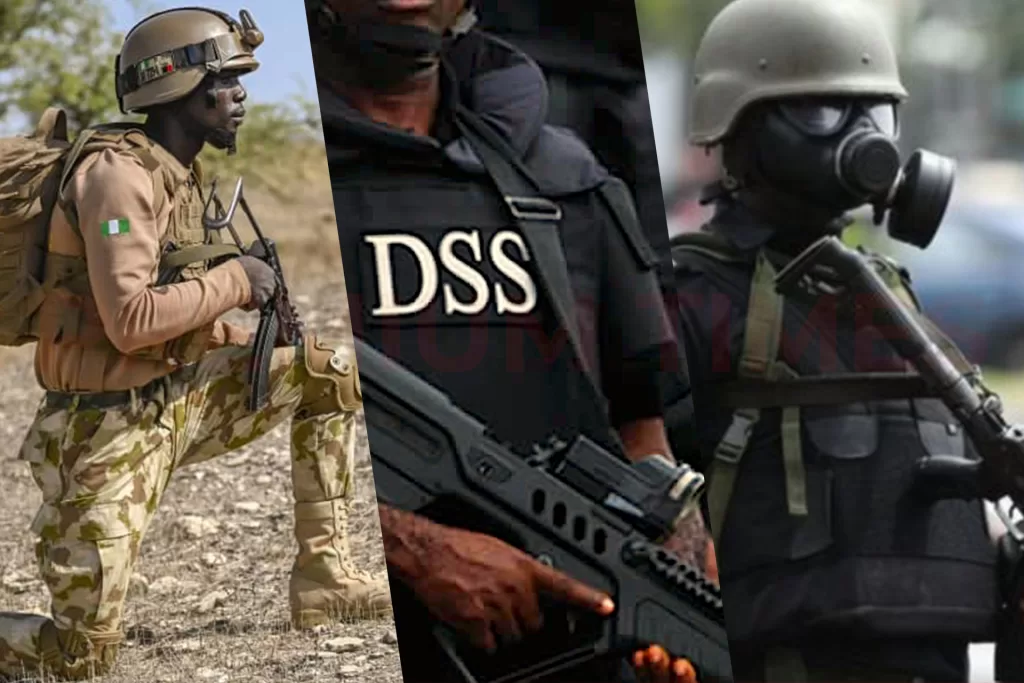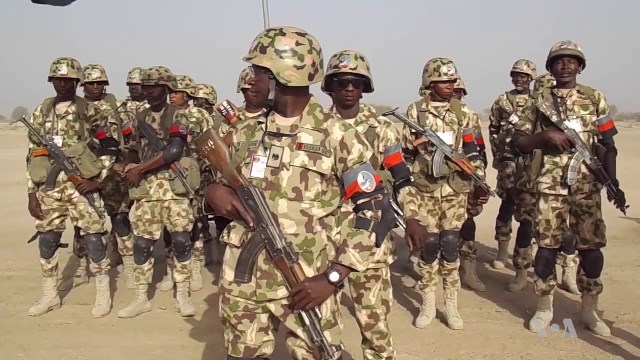DSS and the Nigerian Army: Who is More Powerful?
Last updated on August 4th, 2023 at 08:27 pm
The question as to who is more superior between the DSS and the Nigerian Army stems from the activities done by officers of these security organizations. In recent times, we see the DSS arrest certain powerful politicians and individuals that the Nigerian Army can’t arrest. Are we now to assume that the DSS commands more fear than the Nigerian military? Let’s answer this question below.
In Nigeria, two prominent institutions play vital roles in maintaining the nation’s security and safeguarding its interests: the Department of State Services (DSS) and the Nigerian Army. Both organizations possess significant authority and influence, but the question remains: who is more powerful? In this article, we will delve into the intricacies of the DSS and the Nigerian Army, examining their roles, structures, powers, and limitations. By comparing and contrasting these institutions, we aim to shed light on the power dynamics between them.
OVERVIEW OF DSS (DEPARTMENT OF STATE SERVICES)
The DSS is Nigeria’s primary intelligence agency responsible for protecting the country against internal and external threats. It operates under the purview of the presidency and focuses on gathering intelligence, counterintelligence, and maintaining internal security. The DSS plays a critical role in identifying and neutralizing potential threats to national stability and ensuring the safety of the citizenry.
ROLE AND FUNCTIONS OF DSS
The primary role of the DSS is to provide actionable intelligence to policymakers, enabling them to make informed decisions regarding national security. The agency conducts investigations, carries out surveillance operations, and collaborates with international intelligence agencies to gather intelligence on various threats, including terrorism, espionage, and subversive activities. Additionally, the DSS is responsible for protecting government officials, foreign dignitaries, and critical infrastructure.
STRUCTURE AND ORGANIZATION OF DSS
The DSS operates a hierarchical structure, with the Director-General at the helm. The agency is divided into various departments and units, each specializing in specific areas such as counterterrorism, cybercrime, and protective services. These departments work in tandem to ensure effective intelligence gathering, analysis, and dissemination.
POWERS AND LIMITATIONS OF DSS
The DSS derives its powers from the National Security Agencies Act, which grants it broad authority to carry out its functions. It has the power to arrest and detain suspects involved in activities that pose a threat to national security. However, these powers are not without limitations. The DSS must operate within the confines of the law, respecting human rights and adhering to legal procedures when carrying out its operations.
OVERVIEW OF THE NIGERIAN ARMY
The Nigerian Army is the largest component of the Nigerian Armed Forces and serves as the primary land warfare force in the country. Its primary responsibility is to defend Nigeria’s territorial integrity, maintain internal security, and support civil authorities in times of crises. The Nigerian Army has a rich history and has played a significant role in various peacekeeping missions within and outside Africa.
ROLE AND FUNCTIONS OF THE NIGERIAN ARMY
The Nigerian Army is tasked with a wide range of responsibilities, including defending the nation against external aggression, combating insurgency and terrorism, maintaining law and order, and providing disaster relief and humanitarian assistance. The army also plays a crucial role in promoting national unity and social integration through its involvement in community development projects and outreach programs.
STRUCTURE AND ORGANIZATION OF THE NIGERIAN ARMY
The Nigerian Army is organized into various divisions, brigades, and units spread across the country. It operates a hierarchical structure, with the Chief of Army Staff overseeing its operations. The army is divided into combat arms, combat support arms, and combat service support arms, each having distinct roles and responsibilities within the organization.
POWERS AND LIMITATIONS OF THE NIGERIAN ARMY
The Nigerian Army possesses significant powers to enforce law and order and protect the nation’s interests. It has the authority to engage in combat operations, arrest and detain suspects, and conduct investigations within its jurisdiction. However, like any institution, the army is subject to legal constraints and must operate within the framework of the Nigerian constitution and international law.
COMPARISON OF DSS AND THE NIGERIAN ARMY
The comparison between the DSS and the Nigerian Army can be analyzed across various dimensions, including size and personnel, jurisdiction and authority, focus and specialization, intelligence gathering and counterterrorism, internal security and external defense, and collaboration and coordination. Let’s explore each of these dimensions to better understand the power dynamics between the two institutions.
- Size and Personnel: The Nigerian Army boasts a significantly larger force compared to the DSS, with thousands of personnel deployed across the country. The army’s size enables it to tackle a wide range of security challenges effectively. In contrast, the DSS maintains a more compact workforce with a primary focus on intelligence gathering and analysis.
- Jurisdiction and Authority: While the DSS primarily operates within Nigeria’s borders, its authority extends to matters of national security, counterintelligence, and protection of government officials. The Nigerian Army, on the other hand, has jurisdiction over the country’s entire territory, with the authority to combat external aggression, maintain internal security, and enforce law and order.
- Focus and Specialization: The DSS specializes in intelligence gathering, counterintelligence, and internal security, focusing on threats such as terrorism, espionage, and subversive activities. The Nigerian Army, with its broader mandate, specializes in land warfare, defense against external aggression, and maintaining law and order in challenging environments.
- Intelligence Gathering and Counterterrorism: While both organizations engage in intelligence gathering, the DSS is more dedicated to this aspect, working closely with international intelligence agencies to gather actionable intelligence. The Nigerian Army, while conducting intelligence operations, primarily focuses on counterterrorism efforts and combating insurgency within the country.
- Internal Security and External Defense: The DSS plays a critical role in maintaining internal security by preventing and neutralizing threats to national stability. In contrast, the Nigerian Army is responsible for both internal security and external defense, safeguarding the country against external aggression and maintaining law and order within its borders.
- Collaboration and Coordination: Both the DSS and the Nigerian Army recognize the importance of collaboration and coordination in tackling security challenges effectively. They often work together on joint operations, sharing intelligence and resources to enhance their capabilities and address complex security threats.
THE POWER DYNAMICS BETWEEN DSS AND THE NIGERIAN ARMY
The power dynamics between the DSS and the Nigerian Army are influenced by the unique roles and responsibilities each institution possesses. While the Nigerian Army’s sheer size and military might may suggest a greater overall power, the DSS’s specialized focus on intelligence gathering and analysis grants it significant influence over matters of national security. Ultimately, their power lies in their ability to collaborate and leverage their respective strengths to address the evolving security landscape of Nigeria.
EQUIPMENT AND RESOURCES
Both the DSS and the Nigerian Army rely on advanced equipment and resources to carry out their missions effectively.
The DSS utilizes state-of-the-art surveillance systems, communication technologies, forensic tools, and intelligence analysis software. They also have access to specialized vehicles, weapons, and protective gear to ensure the safety of their operatives during operations.
Likewise, the Nigerian Army is equipped with a diverse range of military hardware, including armored vehicles, artillery systems, helicopters, and advanced infantry weapons. These resources enable them to operate in various environments and effectively respond to different types of threats.
OPERATION SCOPE AND JURISDICTION
While the DSS focuses on domestic intelligence and internal security, the Nigerian Army has a broader operational scope.
The DSS operates within Nigeria and is primarily responsible for gathering intelligence, investigating internal threats, and protecting critical national interests. They work closely with other security agencies to detect and prevent potential security breaches, ensuring the safety and stability of the nation.
In contrast, the Nigerian Army operates both within Nigeria and beyond its borders. They conduct military operations to protect Nigerian interests, participate in peacekeeping missions, and collaborate with regional and international partners to combat transnational threats.
CONTROVERSIES AND CRITICISMS
As powerful institutions entrusted with ensuring national security, both the DSS and the Nigerian Army have faced controversies and criticisms. Some have raised concerns about human rights abuses, lack of transparency, and the need for accountability in their operations. Balancing security imperatives with respect for human rights remains an ongoing challenge that these institutions must address to maintain public trust. ALSO READ HOW TO REPORT A SOLDIER FOR MISCONDUCT IN NIGERIA.
PUBLIC PERCEPTION AND FEAR FACTOR
The public perception and fear associated with the DSS and the Nigerian Army are influenced by various factors.
The DSS, being an intelligence agency, often operates covertly, making their activities less visible to the public. This has led to a certain level of mystery and intrigue surrounding their operations, which can contribute to fear or uncertainty among some individuals. Additionally, the DSS has been involved in controversial incidents in the past, leading to mixed opinions about their methods and effectiveness.
On the other hand, the Nigerian Army’s visibility and involvement in counter-insurgency operations have garnered significant attention. Their presence in conflict zones and the risks they face on a daily basis can instill a sense of fear and admiration among the public. The Nigerian Army’s commitment to protecting the nation’s sovereignty and their sacrifices in the face of adversity have contributed to their perceived fear factor.
CONCLUSION
In conclusion, the DSS and the Nigerian Army are both powerful institutions that play vital roles in safeguarding Nigeria’s security and interests. While the Nigerian Army’s military might is undeniable, the DSS’s specialized focus on intelligence gathering and analysis grants it significant influence over matters of national security. The power dynamics between these institutions are shaped by collaboration, coordination, and their ability to leverage their respective strengths. Ultimately, their effectiveness lies in their commitment to upholding the rule of law, respecting human rights, and addressing the ever-changing security challenges faced by Nigeria.
FAQs
Q: Does the DSS have the power to arrest individuals?
A: Yes, the DSS has the authority to arrest individuals suspected of activities that pose a threat to national security.
Q: Can the Nigerian Army engage in law enforcement operations?
A: Yes, the Nigerian Army can support civil authorities in maintaining law and order during crises or emergencies.
Q: Do the DSS and the Nigerian Army collaborate on security matters?
A: Yes, the DSS and the Nigerian Army often collaborate on joint operations, sharing intelligence and resources to enhance their capabilities.
Q: Can the DSS operate outside Nigeria’s borders?
A: The primary jurisdiction of the DSS is within Nigeria, but it may collaborate with international intelligence agencies on matters of mutual interest.
Q: Are there oversight mechanisms in place to ensure accountability?
A: Yes, both the DSS and the Nigerian Army are subject to oversight mechanisms to ensure transparency and accountability in their operations.





